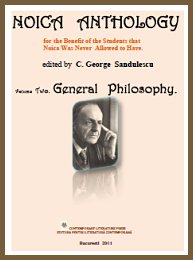Constantin Noica: 2. General Philosophy
 |
Edited by C. George Sandulescu.Please click the image or the link below and choose "Save file" to download the book in .pdf format Constantin Noica: 2. General PhilosophyNote: Because of the large size of some files, we recommend saving them to your computer before opening (right-click on the link and choose "Save Link As").
|
|
| ||
Note: Because of the large size of some files, we recommend saving them to your computer before opening (right-click on the link and choose "Save Link As").
Drumul lui Constantin Noica.
Orice antologie este în primul rând un îndemn la lectură. Cititorul își face o idee, și – în situația ideală – se îndreaptă către volumul întreg, din care tocmai a citit un fragment. Cu condiția ca fragmentul să-l fi interesat, desigur. Antologia mai are și o trăsătură definitorie: ea se adresează unui public larg. Înainte de a fi cunoscător, cititorul prospectează.
Antologia de față, aflată la al doilea volum, oferă spre edificare opera filosofului Constantin Noica. Dintre cei patru prieteni, toți scriitori români – Mircea Eliade, Emil Cioran, Eugène Ionesco și Constantin Noica –, primii trei sunt bine cunoscuți Occidentului, au fost publicați acolo și citiți pe scară largă. Adunăm acum, în această antologie, o mică parte din opera lui Noica, doar câteva lucrări traduse în limba engleză, în încercarea de a restabili oarecum echilibrul. Textele lui “reprezentative” sunt astfel transpuse în limba pe care o vorbesc copiii și nepoții lui în acest moment, știut fiind că autoritățile din România izgoniseră din țară – cu proverbiala lor “mărinimie” – pe soția și copiii lui Noica, pentru totdeauna.
Primul volum, Doing Time... , a publicat eseul Atitudinea Noica, scris de editorul tuturor volumelor, C. George Sandulescu. A publicat de asemenea Pray for Brother Alexander, traducere făcută de soția filosofului, Katherine Noica-Muston, precum și eseul The Time of Reality and the Time of the Logos.
Acest al doilea volum din Noica Anthology for the Benefit of the Students that Noica Was Never Allowed to Have se intitulează General Philosophy. în prima parte sunt publicate în traducerea engleză a editorului, C. George Sandulescu, fragmente din cărțile scrise de filosof din anul 1934 până în anul 1949, când i s-a dat domiciliu obligatoriu la Câmpulung Muscel: Mathesis, De Caelo și Jurnal Filosofic (Philosophical Journal). Imaginea interbelică a filosofului e completată de articolul cu care începe prima parte, Moartea omului de mâine (Death of the Tomorrow Man), publicat în ziarul Criterion în 1934.
Partea a doua se ocupă de cărțile scrise și publicate după ce Noica a ieșit din închisoare în 1964. Sunt publicate în limba engleză capitole scurte din Șase maladii ale spiritului contemporan (Six Maladies of the Contemporary Spirit) și Devenirea întru ființă (The Becoming within Being), în traducerea lui Alistair Ian Blyth. Cea dintâi analizează istoria, cultura și individul, toate în context european. Cea de-a doua e un tratat de ontologie, o filozofie a “ființei”.
Volumul se încheie cu un text adresat de C. Noica elevilor unui liceu din București în anul 1986, cu un an înaintea morții, și cu The Observer Weekend Review, Sunday, 18 May 1961 – care îl includea și pe Noica printre cei șase prizonieri politici ce au făcut obiectul Apelului la Amnistie din 1961 al ziarului londonez The Observer.
În chip semnificativ, în introducerea volumului, imediat după eseul editorului, Jacqueline de Romilly, Membre de l’Académie Française, evocă personalitatea filosofului, în „Du chemin de la vérité” – „Drumul Adevărului”... citat-titlu cum nu se poate mai simbolic.
LIDIA VIANU Bucharest, 18 January 2011
Please click on the link below and choose "Save file" to download the book in .pdf format
Constantin Noica: 2. General PhilosophyNote: Because of the large size of some files, we recommend saving them to your computer before opening (right-click on the link and choose "Save Link As").
